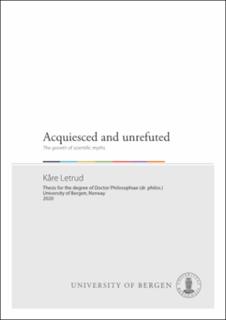Acquiesced and unrefuted : The growth of scientific myths
Doctoral thesis
Permanent lenke
https://hdl.handle.net/1956/22311Utgivelsesdato
2020-06-05Metadata
Vis full innførselSamlinger
- Department of Philosophy [240]
Sammendrag
This thesis explores the phenomenon of scientific myths distributed in academic discourses. Drawing on a set of myth-examples, I explicate a definition of the term ‘scientific myth’, arguing that it ought primarily to be characterised by the tension between a lack of epistemic warrant on the one hand, and an extensive proliferation in formal academic channels of publications on the other. I then delineate scientific myths from the closely associated pseudosciences: The sciences, although distributing some unreliable statements, do not bestow upon such statements the same authority and importance as the pseudosciences do. From these demarcative deliberations, I proceed to address the question of myth diffusion, of how misconceptions grow to scientific myths. Discussing myth-propagation, I argue that a fundamental explanation for myth-spreading is deficient epistemic practices. Omissions of citations, although a both common and pertinent explanation, only account for some aspects of myth spreading. In the context of research debates, the issue of myth diffusion also includes efforts at debunking scientific myths in academic publications. Our findings indicate that there is an ‘Affirmative Citation Bias’, that counteracts debunking attempts by effectively disarming the critique: Instead of being distributed, the critique is buried in an avalanche of myth-affirming publications. Finally, I discuss whether scientific myths ought to be somewhat vindicated. They could conceivably have an anti-dogmatic function in academic debates, by representing alternatives to the established consensus, in accordance with Millsian and Feyerabendian ideals for truth seeking discourse. I conclude in the negative: Scientific myths have dogmatic aspects themselves.
Består av
Paper I: Letrud, K., & Hernes, S. (2016). The diffusion of the learning pyramid myths in academia: an exploratory study. Journal of Curriculum Studies, 48(3), 291-302. The article is not available in BORA due to publisher restrictions. The published version is available at: https://doi.org/10.1080/00220272.2015.1088063Paper II: Letrud, K., & Hernes, S. (2018). Excavating the origin of the learning pyramid myth. Cogent Education, 5(1), 1518638. The article is available in the main thesis. The article is also available at: https://doi.org/10.1080/2331186X.2018.1518638
Paper III: Letrud. K. (2019). The Gordian Knot of Demarcation: Tying Up Some Loose Ends. International Studies in the Philosophy of Science, 32(1), 3-11. The article is not available in BORA due to publisher restrictions. The published version is available at: https://doi.org/10.1080/02698595.2019.1618031
Paper IV: Letrud, K. (2019) The propagation of myths in academic publications: A case study. The article is not available in BORA.
Paper V: Letrud, K., & Hernes, S. (2019). Affirmative citation bias in scientific myth debunking: a three-inone case study. PLoS ONE, 14(9), e0222213. The article is available at: http://hdl.handle.net/1956/22310

